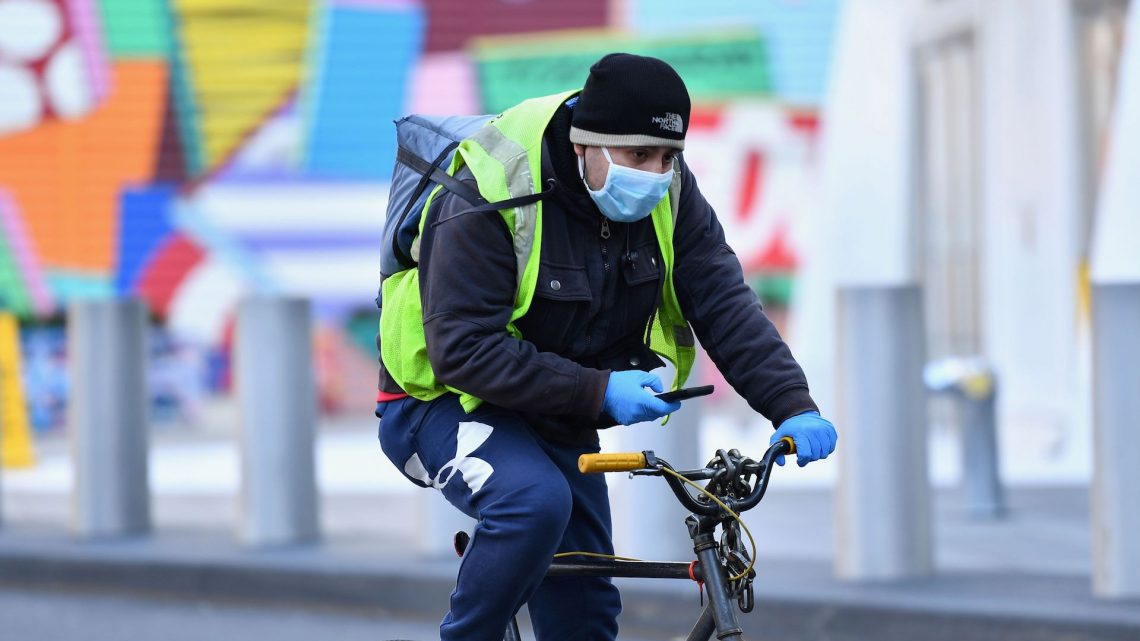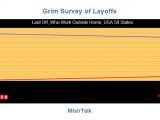
Food Delivery Workers Told Us About Their ‘Indescribable Fear’ During the Coronavirus Outbreak
March 19, 2020While government officials have shut down restaurants across the country, delivery workers are acting as a lifeline for the food service economy.
But the work puts couriers — comprised largely of independent contractors without access to employer-sponsored health insurance or paid sick leave — at a heightened risk of COVID-19 infection.
“The experience is indescribable fear,” said Ali, a Chinese-American food delivery worker in New York City. He would only provide his surname and spoke to VICE News through a translator. “I was really worried while making deliveries.”
Ali, who has delivered food for city restaurants for ten years, continued to work after COVID-19 began spreading through the city. His restaurant provided gloves, masks, and hand sanitizer, but he still worried about exposure.
Tips from customers increased over the past few weeks, but only slightly. Buildings he served stopped letting him inside to hand off the food.
And on Tuesday, the restaurant where he works closed. Ali, like most gig economy workers, has no access to paid time off.
“Many of us are not able to work right now,” he said.
The coronavirus threat has pushed the tech companies that make delivery apps — and the governments that regulate them — to make emergency changes to keep deliveries flowing.
New York, which closed restaurants and bars through April 15, still allows take-out and delivery services to continue. Under pressure from other city officials, New York City Mayor Bill de Blasio temporarily halted police enforcement on the city’s ban on motorized bicycles commonly used by delivery workers.
The move came after City Council members wrote to the mayor requesting he ask police to stop confiscating bikes and imposing fines, which can reach $500.
During the coronavirus pandemic, some of the largest food delivery companies altered benefits offered to couriers to provide some paid sick leave, fund certain health-related expenses, and mandated new delivery service options that can help reduce contact to other people. Some are eliminating fees charged to restaurants for using their services and providing cleaning supplies.
Postmates changed its platform to reduce person-to-person contact by allowing customers to digitally request their food be dropped off outside their door. DoorDash now makes no-contact delivery its default option. For grocery deliveries, Instacart started offering a similar option this month. Customers can also ask to meet outdoors so workers can reduce trips into buildings.
Some workers diagnosed with the virus now have access to a form of paid sick leave. DoorDash announced that the company would provide workers diagnosed with COVID-19 with two weeks of financial assistance, so long as they have been registered couriers for the past 60 days and made at least 30 deliveries in the past month.
Uber, along with its food delivery service, Uber Eats, offers a similar plan to those affected. For health-related expenses, Postmates is providing eligible workers with a health savings account credit for those living in states with reported cases of COVID-19.
While the new paid sick leave policies may come with good intentions, the requirement of proving symptoms does little to help immunocompromised workers at high risk of serious complications from the virus. To secure the benefits, they have to prove a diagnosis, forcing some without other options to work until they get sick. Since some people who have the virus don’t show symptoms for many days, or at all, it could leave infected workers on the beat.
“They’re very scared right now,“ said Do Lee, a professor at Queens College who studies and advocates for delivery workers in New York City. “A lot of them do it because there’s no other way they can survive without working.”
The companies’ efforts may not go far enough, Lee said. With frequent movement throughout cities, delivery workers don’t have sufficient access to cleaning supplies like gloves, masks, hand sanitizer and disinfectant wipes that can minimize their risk.
“Are they providing enough health and sanitary supplies for the workers? From what I’m seeing they are absolutely not,” Lee said. “It’s absolutely reprehensible to not be providing delivery workers with these materials whether or not you’re providing paid sick leaves because that depends on if you have the symptoms.”
“I’m not working because of the virus. It’s not worth it.”
For a community of low-paid workers living on the margins, the decision of whether to work until they’re sick or not work at all, is not an easy one.
Wilfred Chan, a 28-year-old food delivery worker from New York’s Lower East Side, made the difficult choice to stop delivering food around the city. For two years, he has earned extra income by delivering food by bicycle for up to four hours a day, earning a crucial supplement to his work as a writer. The risk of getting COVID-19, he says, is too high.
“I’m not working because of the virus,” Chan told VICE News. “It’s not worth it.”
For those still ordering food to be delivered, Chan urges people who use order food through delivery apps to increase tip to $10-$15 during the pandemic and to utilize the “no contact” options.
“Delivery workers are extremely vulnerable right now,” he said. “Please be considerate.”
Cover: A food delivery person is seen on a bike on March 18, 2020 in New York City. (Photo: ANGELA WEISS/AFP via Getty Images)


